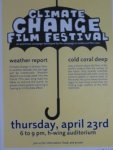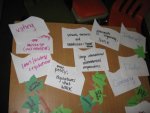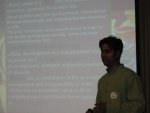
Publicado em 3 de junho de 2009
Traduções disponíveis em:
US Film Festivals Raise Awareness, Mobilize Action on Our Responsibility for Water
por Nina GREGG
Temas fortes ligados:
Meio ambiente e responsabilidade .
Temas largos ligados:
Mudança climática .
Água .
Arte .
Environment .
Sustainable development .
Global Citizens’ Climate Change & Water Film Festival, March-April 2009
The Global Citizens’ Climate Change & Water Film Festival visited ten college and university campuses in the US between March 22 and April 27, 2009. Student groups and community organizations sponsored the festival at each location. Nina Gregg, US Charter Coordinator and Anugraha John from Global Citizens for Sustainable Development in Bangalore, India led discussions and workshops and encouraged students to identify their responsibilities for water in their own communities and around the world.
|
The film festival began in India as a project of Global Citizens for Sustainable Development. In 2008 Anugraha John began seeking partners to bring the festival to other countries. During 2008 and 2009 Nina Gregg secured donations of additional films to complement the films GCSD had been screening. More than 40 films, including newly released features like Blue Gold, Flow, Weather Report and Who’s Got the Power and shorter educational documentaries were made available free for the festivals. Planning began in the fall of 2008 during which each campus designed its own festival, selected films and organized related events and activities.
In the workshops, participants used a quiz and cards with water facts (questions and answers) to explore basic information such as who has access to clean drinking water, the amount of water used in producing everyday goods, and how much clean drinking water is never consumed but rather goes down our drains. The exercise “Our Responsibility for Water” engaged participants in identifying their dreams for water (for example: cleanup of a local lake, clean water for all, safe swimming and fishing), the barriers to fulfilling those dreams (for example: ignorance, unenforced regulations. bad habits), the resources they can draw on to over come those barriers (for example: education, more workshops, lobbying legislators, personal behavior) and the actions each would take.
At Xavier University in Cincinnati, Ohio, the Women’s Center and the Office of International Student Services sponsored the festival on March 22, World Water Day.
At American University in Washington, DC, the Anthropology Department hosted the festival on April 3. One highlight was the panel of community activists who heightened attention to local issues and the importance of public policy. Michelle Roberts, Campaign and Policy Coordinator from Advocates for Environmental Human Rights, Matt Stern, Campus Campaign Director for the Chesapeake Climate Action Network and Kari Fulton, Coordinator of the National Campus Climate Challenge of the Environmental Justice and Climate Change Initiative addressed environmental justice issues and identified ways to become involved locally, nationally and globally.
Roberts addressed the relationship between the industrialization of the US Gulf Coast by petrochemical companies, the destruction of coastal barriers to flooding, contamination of formerly sustainable communities, and the disproportionate impact on the viability and health of communities of color. Stern explained the Cap & Dividend policy proposal, which is an alternative to the Cap & Trade policy that currently dominates US policy discussion about reducing carbon emissions. Cap & Dividend “makes polluters pay by auctioning 100 percent of carbon permits instead of giving them away, contains no controversial ‘carbon offsets,’ and returns all carbon revenues back to the American public as a monthly dividend” (see http://www.chesapeakeclimate.org/ca... for more details). Fulton urged students to become involved in the national youth climate movement (see http://www.powershift09.org/campaignhome), which mobilized 12,000 students to travel to Washington, DC at the end of February. Students lobbied elected officials to take bold, comprehensive and immediate action on climate change and are continuing to organize around the country. Fulton also talked about engaging young people through art and music, giving as one example Mos Def’s “New World Water” (see http://www.youtube.com/watch?v=bg8c... and lyrics http://www.metrolyrics.com/new-worl...)
| (Left to right) Michelle Roberts from Advocates for Environmental Human Rights, Matt Stern from Chesapeake Climate Action and Kari Fulton from Environmental Justice and Climate Change Initiative led a discussion about policy and activism |
Anugraha John traveled to Massachusetts for two festivals: Harvard University’s Center for the Environment hosted the festival on April 5, and Brandeis University’s Environmental Studies Program hosted the festival on April 6.
On April 8 John and Nina traveled to The College of New Jersey, where the film festival was organized by Water Watch, Alpha Kappa Delta, the Department of Sociology and Anthropology, the Department of Philosophy and Religion, the Alan Dawley Center for the Study of Social Justice, and the Committee for Cultural and Intellectual Community (CCIC). TCNJ has signed the American College and University Presidents’ Climate Commitment, an effort by leaders in higher education nationwide to address global warming by reducing their institutions’ impact on the environment (see www.presidentsclimatecommitment.org).
On Sunday, April 19 Nina led a discussion on “Our Responsibility for Water” at Foothills Unitarian Universalist Fellowship in Tennessee. Later that day, the film festival got underway at Maryville College (TN). The Center for Strong Communities, Environmental Studies and three student groups (Environmental Action Team, Peace & World Concerns, and Global Citizenship Organization) and the Little River Watershed Organization had been planning the three-day film festival for several months. Feature films, workshops with college and high school students, short film screenings in the campus coffee shop and a chapel service about water were part of the College’s week-long Earth Day celebration, culminating in the annual community clean-up sponsored by the Little River Watershed Organization and other community groups.
| ‘Our Responsibility for Water’ represented in dreams (green leaves), barriers (grey boulders at the bottom) and resources to overcome the barriers (white clouds above) |
University of the South’s festival was held on April 22, followed by the festival at Ramapo College in New Jersey on April 23 & 24. This film festival was a project of the Campaign in Media and Film class taught by Maria Siano and was integrated into a two-day campus-wide Green Fest. The films were part of an evening program that included screenings of students’ award-winning public service advertisements, a presentation by a local business owner who has implemented energy and water conservation measures at his car wash (see www.wayneautospa.com), and a choral performance of works about the Earth.
Ramapo College has signed both the New Jersey Covenant of Sustainability and the Talloires Declaration. The Covenant commits the institution to greenhouse gas reductions. Ramapo joined more than 281 colleges in 47 nations – from Argentina to Zimbabwe – that have signed the Talloires Declaration and adopted the action plan that strives to raise environmental awareness, reverse environmental degradation and promote environmentally-sustainable lifestyles. The Declaration has 10 key environmental principles, ranging from a commitment to sustainable campus practices to placing a priority on environmental education as part of the curriculum (see http://www.ulsf.org/programs_talloi...).
On April 24, Anugraha John took part in the Pan Asia Spring Festival 2009 at University of Chicago, where he screened two films and made a presentation on issues related to climate change in Asia.
The last film festival of the season was held at Western Kentucky University on April 25 & 26 as part of the annual conference of the Campus Community Partnership for Sustainability, a state-wide initiative fostering partnerships between Kentucky colleges and universities and their local communities to work together towards a sustainable future. Through this partnership institutions of higher learning aim to become models of responsible environmental stewardship, using their human and technical capacity as well as their institutional operations to improve the quality of life in the communities where they are located and which they serve. WKU is another signatory of the Taillores Declaration.
The US Charter Committee and Global Citizens for Sustainable Development aimed, through the film festivals, to raise awareness of local and global water issues and to mobilize action. Based on responses from film goers and workshop participants, we are confident our aims were realized. Among the comments made at the film festivals were the following:
![]() What can I do as an individual, in my own home and community, to protect water resources, to conserve water, and to ensure everyone has access to clean water?
What can I do as an individual, in my own home and community, to protect water resources, to conserve water, and to ensure everyone has access to clean water?
![]() When water is privatized and becomes a market commodity, the greatest impact is felt by the poor.
When water is privatized and becomes a market commodity, the greatest impact is felt by the poor.
![]() Bottled water is a necessity in some parts of the world, but in the developed west it consumes resources (through production and transportation) and leaves a mountain of plastic.
Bottled water is a necessity in some parts of the world, but in the developed west it consumes resources (through production and transportation) and leaves a mountain of plastic.
![]() Our care of our waterways is connected to our access to clean drinking water.
Our care of our waterways is connected to our access to clean drinking water.
![]() It’s not enough to conserve water in my own home. This issue is bigger than individual consumption. We need to be thinking about the entire community – people, businesses, recreation, and habitat.
It’s not enough to conserve water in my own home. This issue is bigger than individual consumption. We need to be thinking about the entire community – people, businesses, recreation, and habitat.
Film festival organizers are now reflecting on the total experience. Nina will maintain contacts with each campus and explore opportunities for continuing activities and relationships. Global Citizens for Sustainable Development will take on a project, Malhar ’09 to offset the carbon footprint of the travel related to the US film festivals.
We are already hearing from campuses that would like to host the festival in 2010! A decision about another US film festival has not yet been made. We welcome suggestions of new films and other media addressing water issues. We are also looking for opportunities to partner with other events and organizations to extend the scope and reach of the festival and to have a broader impact on policy and policy-makers.
Please contact Nina Gregg charter.US kow alliance21.org or charter_US kow att.net and Anugraha John ajohn316 kow globalcitizens.org.in or ajohn316 kow gmail.com with your suggestions.















